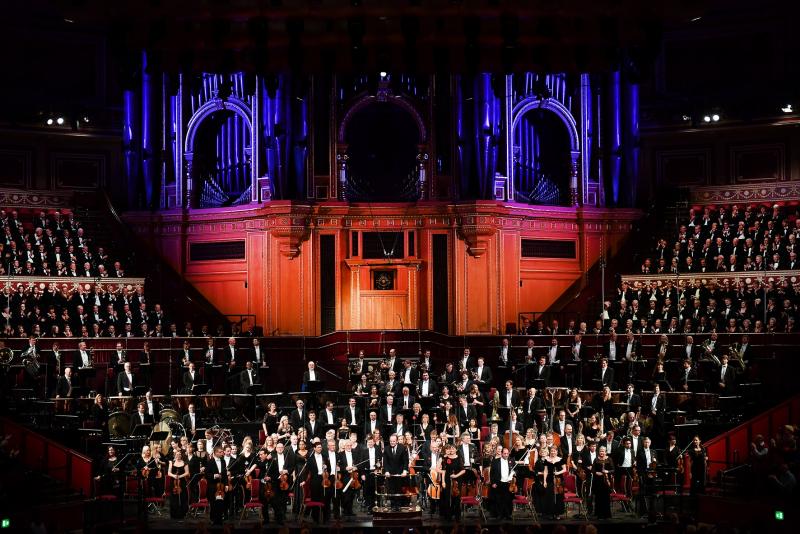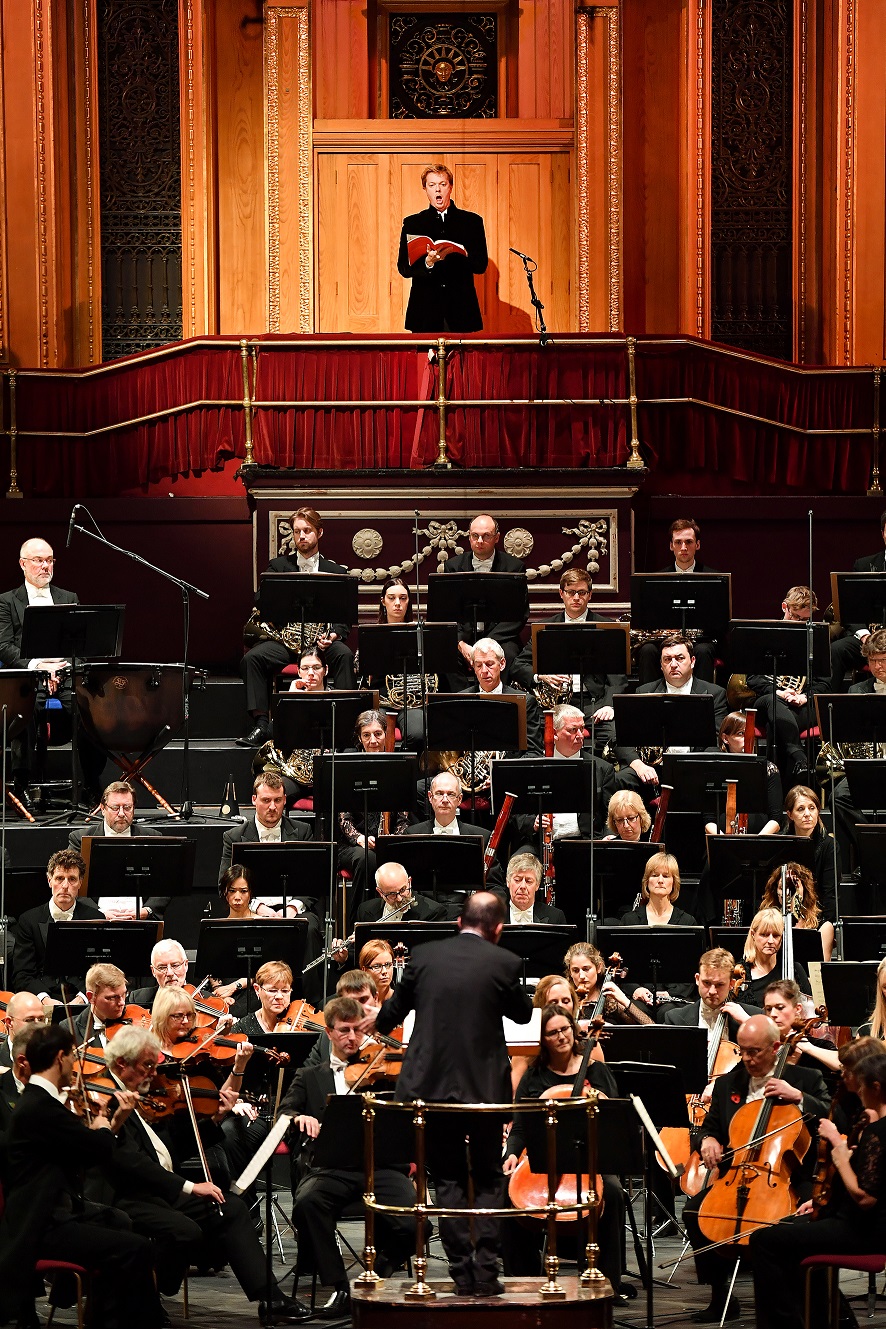Grande Messe des Morts, BBCSO, Roth, RAH | reviews, news & interviews
Grande Messe des Morts, BBCSO, Roth, RAH
Grande Messe des Morts, BBCSO, Roth, RAH
A very French Requiem for Remembrance Day

Lest we forget. On Flanders’ Fields. For the Fallen. No one does stiff-upper-lip, buttoned-up remembrance quite like the English. Since its composition only a little over half a century ago, the War Requiem has become our national anthem for the departed.
No less immediately French in sound and impact, the Grande Messe des Morts strikes a quite different key signature. Ever more an embittered atheist, Berlioz was not in the business of consolation. First performed at a military funeral in the vast acoustic of Les Invalides, his Requiem embodies the French Republic at prayer.
The BBC Symphony Orchestra has a Berlioz tradition of its own stretching back to the 1960s and the stewardship of Sir Colin Davis, but they can rarely have played French music this way, except under Marc Minkowski. As he did for L'enfance du Christ three years ago, François-Xavier Roth turned them into a period band without making a Norringtonian song and dance about it. The string bass sound was planed smooth and warm as a communion rail. Violins found a plangent yet sweet register that suited Berlioz to perfection. Pure tone throughout the orchestra brought detail, bright and shining, from what is often a set of sonic monoliths irregularly separated by subterranean rumbling.

Still more striking and revelatory was the choral work. Rex tremendae was thrillingly hurled out by the BBC Symphony Chorus, Crouch End Festival Chorus and London Philharmonic Choir, banked either side of the unused organ. Meticulously enunciated French Latin closed up the vowels of key words such as "futurus", blending them pungently with a wind band which seemed to include every bassoonist in London. The effect was continually fresh and enlightening, opening our ears on to the music Berlioz would have had in mind when writing the Requiem in 1836-7, not only his near contemporaries such as Gluck and Le Sueur but Baroque masters of ceremony such as Rameau and Delalande. The thunderous Dies Irae was like a Charpentier psalm setting inflated to Babylonian proportions, sung as if by the population of a city under siege.
Roth never allowed the size or acoustic of the Royal Albert Hall to dictate terms to him. His theatrically astute pacing carried energy through to the Requiem’s weaker second half and brought a welcome clarity of structure to its ritualistic alternation of bold but undeveloped material. The Offertory could be heard as a long echo of fragmented ideas in the wake of the Lacrymosa’s infernal canons. Roth's ear for modernist sonority made unsettling sense of the Hostias, in which a male chorus of supplicants was framed by an instrumental scaffold of flutes and trombones as hollow and desolate as a bombed-out cathedral.
The tenor solo of the Sanctus was radiantly sustained by Toby Spence (pictured above), if not without obvious effort, and accompanied by a flute solo of unearthly purity from Michael Cox. With his unfussy authority, Roth held the silence which fills the void after the Agnus dei’s final drum-taps: a welcome gesture of sobriety at the end of a concert and a day to remember.
rating
Share this article
Add comment
The future of Arts Journalism
You can stop theartsdesk.com closing!
We urgently need financing to survive. Our fundraising drive has thus far raised £49,000 but we need to reach £100,000 or we will be forced to close. Please contribute here: https://gofund.me/c3f6033d
And if you can forward this information to anyone who might assist, we’d be grateful.

Subscribe to theartsdesk.com
Thank you for continuing to read our work on theartsdesk.com. For unlimited access to every article in its entirety, including our archive of more than 15,000 pieces, we're asking for £5 per month or £40 per year. We feel it's a very good deal, and hope you do too.
To take a subscription now simply click here.
And if you're looking for that extra gift for a friend or family member, why not treat them to a theartsdesk.com gift subscription?
more Classical music
 Goldscheider, Brother Tree Sound, Kings Place review - music of hope from a young composer
Unusual combination of horn, strings and electronics makes for some intriguing listening
Goldscheider, Brother Tree Sound, Kings Place review - music of hope from a young composer
Unusual combination of horn, strings and electronics makes for some intriguing listening
 theartsdesk Q&A: composer Donghoon Shin on his new concerto for pianist Seong-Jin Cho
Classical music makes its debut at London's K-Music Festival
theartsdesk Q&A: composer Donghoon Shin on his new concerto for pianist Seong-Jin Cho
Classical music makes its debut at London's K-Music Festival
 Helleur-Simcock, Hallé, Wong, Bridgewater Hall, Manchester review - moving lyricism in Elgar’s concerto
Season opener brings lyrical beauty, crisp confidence and a proper Romantic wallow
Helleur-Simcock, Hallé, Wong, Bridgewater Hall, Manchester review - moving lyricism in Elgar’s concerto
Season opener brings lyrical beauty, crisp confidence and a proper Romantic wallow
 Kohout, Spence, Braun, Manchester Camerata, Huth, RNCM, Manchester review - joy, insight, imagination and unanimity
Celebration of the past with stars of the future at the Royal Northern College
Kohout, Spence, Braun, Manchester Camerata, Huth, RNCM, Manchester review - joy, insight, imagination and unanimity
Celebration of the past with stars of the future at the Royal Northern College
 Jansen, LSO, Pappano, Barbican review - profound and bracing emotional workouts
Great soloist, conductor and orchestra take Britten and Shostakovich to the edge
Jansen, LSO, Pappano, Barbican review - profound and bracing emotional workouts
Great soloist, conductor and orchestra take Britten and Shostakovich to the edge
 Jakub Hrůša and Friends in Concert, Royal Opera review - fleshcreep in two uneven halves
Bartók kept short, and a sprawling Dvořák choral ballad done as well as it could be
Jakub Hrůša and Friends in Concert, Royal Opera review - fleshcreep in two uneven halves
Bartók kept short, and a sprawling Dvořák choral ballad done as well as it could be
 Hadelich, BBC Philharmonic, Storgårds, Bridgewater Hall, Manchester review - youth, fate and pain
Prokofiev in the hands of a fine violinist has surely never sounded better
Hadelich, BBC Philharmonic, Storgårds, Bridgewater Hall, Manchester review - youth, fate and pain
Prokofiev in the hands of a fine violinist has surely never sounded better
 Monteverdi Choir, ORR, Heras-Casado, St Martin-in-the-Fields review - flames of joy and sorrow
First-rate soloists, choir and orchestra unite in a blazing Mozart Requiem
Monteverdi Choir, ORR, Heras-Casado, St Martin-in-the-Fields review - flames of joy and sorrow
First-rate soloists, choir and orchestra unite in a blazing Mozart Requiem
 Cho, LSO, Pappano, Barbican review - finely-focused stormy weather
Chameleonic Seong-Jin Cho is a match for the fine-tuning of the LSO’s Chief Conductor
Cho, LSO, Pappano, Barbican review - finely-focused stormy weather
Chameleonic Seong-Jin Cho is a match for the fine-tuning of the LSO’s Chief Conductor
 Classical CDs: Shrouds, silhouettes and superstition
Cello concertos, choral collections and a stunning tribute to a contemporary giant
Classical CDs: Shrouds, silhouettes and superstition
Cello concertos, choral collections and a stunning tribute to a contemporary giant
 Appl, Levickis, Wigmore Hall review - fun to the fore in cabaret and show songs
A relaxed evening of light-hearted fare, with the accordion offering unusual colours
Appl, Levickis, Wigmore Hall review - fun to the fore in cabaret and show songs
A relaxed evening of light-hearted fare, with the accordion offering unusual colours
 Lammermuir Festival 2025, Part 2 review - from the soaringly sublime to the zoologically ridiculous
Bigger than ever, and the quality remains astonishingly high
Lammermuir Festival 2025, Part 2 review - from the soaringly sublime to the zoologically ridiculous
Bigger than ever, and the quality remains astonishingly high

Comments
Interesting to see the piece
Thanks for your reply. I also
Thanks for your reply. I also see from Twitter how precise he was with pronunciation requirements. They certainly paid off! Peter
Wish I'd been there. I walked
Thanks, Roger. I do recommend
Thanks, Roger. I do recommend tuning in. Peter
I was there that day in the
Thank you for that memory, Mr
Thank you for that memory, Mr. Jones. Especially poignant in the light of last night's fire. And of course York Minster had something similar to deal with, though not on as vast a scale if memory serves.
The first paragraph of this
Dear WaldteufelThanks for
Dear Waldteufel
Thanks for reading and responding. I've re-read my first paragraph and can't see where I'm insulting anyone. I'd say the Requiems of Britten and Berlioz do have a lot in common, in origin, material and reception. Reservations have been widely expressed about the War Requiem ever since its premiere, which as you say should not, and does not, prevent very many listeners from being deeply moved by it. Thanks, Peter
Those reservations are merely
"Reservations" can be much